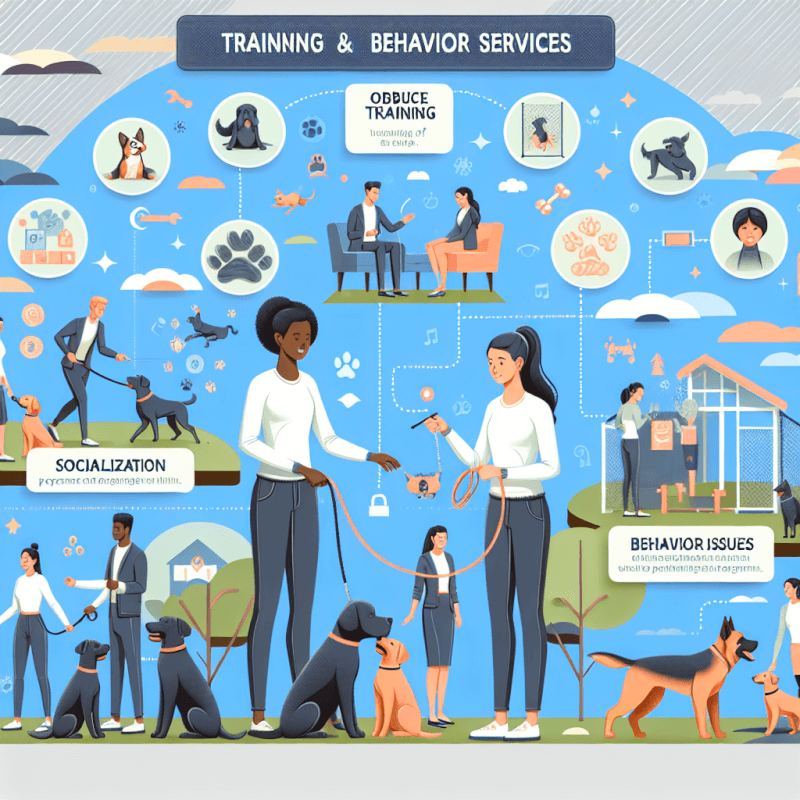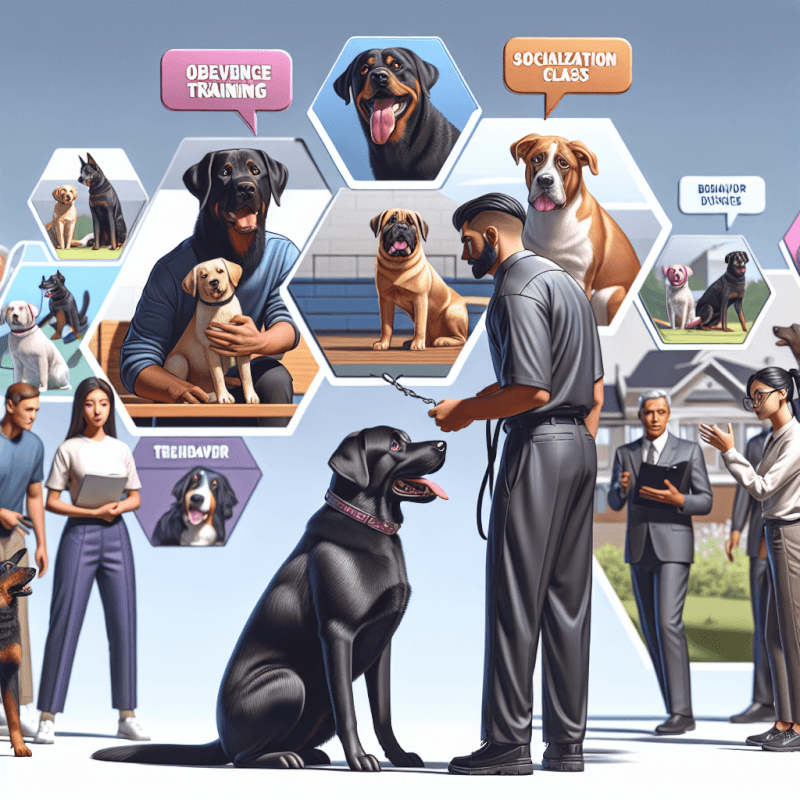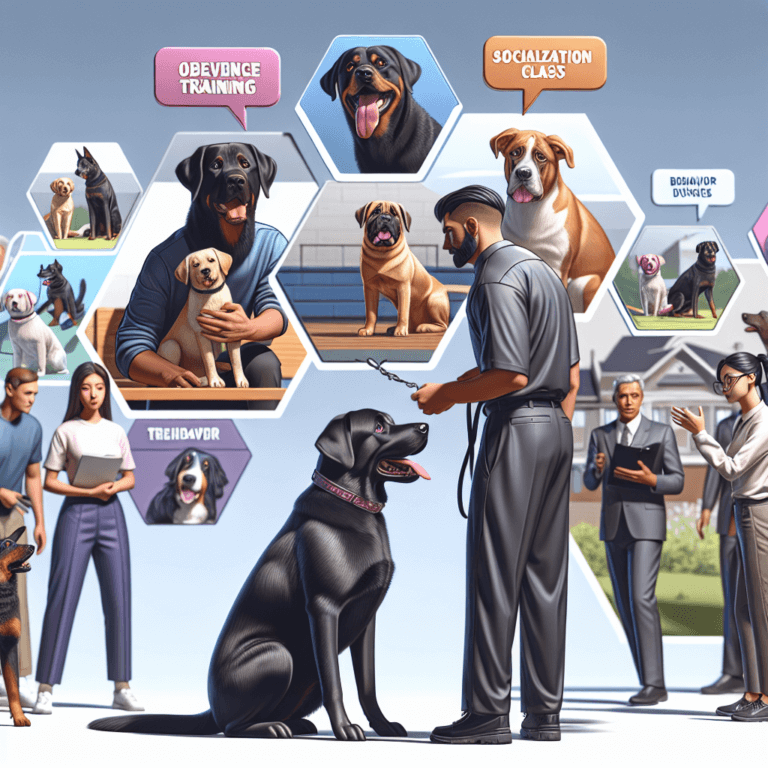Are you looking for professional and reliable services to help train and improve the behavior of your beloved canine companion? Look no further than Canine Training and Behavior Services. Our team of experienced trainers is ready to assist you in providing the best care for your furry friend. Whether you need assistance with basic obedience training or help in tackling behavioral issues, our comprehensive services are tailored to meet your specific needs. With our expertise and friendly approach, we are committed to helping you establish a strong bond with your dog and create a harmonious living environment. Trust us to provide top-notch training and behavior services for your precious pup.

Types of training and behavior services
Obedience training
Obedience training is a fundamental aspect of canine training that focuses on teaching your dog basic commands and manners. This type of training helps your dog understand and respond to commands such as sit, stay, come, and heel. Obedience training is essential for establishing a strong bond with your dog and ensuring their safety in various situations.
Ready for Cat Trivia?
Test your knowledge about cats!

Puppy training
Puppy training is specifically designed for young dogs to instill good behavior habits from the start. This training covers basic obedience commands but also includes socialization with other animals and people. By starting early, you can prevent problem behaviors from developing and help your puppy grow into a well-behaved and well-adjusted adult dog.
Agility training
Agility training involves teaching your dog to navigate an obstacle course with speed and precision. This type of training not only provides physical exercise for your dog but also enhances their coordination, focus, and problem-solving abilities. Agility training is often done as a sport and can be a fun way to bond with your dog while keeping them mentally stimulated.
Behavior modification
Behavior modification training focuses on addressing and modifying problem behaviors in dogs. This type of training is suitable for dogs with issues such as aggression, anxiety, excessive barking, and more. Behavior modification training aims to understand the root causes of these behaviors and implement techniques to change them. It can greatly improve the overall well-being of your dog and create a more harmonious relationship.
Service dog training
Service dog training is a specialized type of training that prepares dogs to assist individuals with disabilities. These dogs are trained to perform specific tasks to aid their handlers, such as guiding the visually impaired, alerting individuals with hearing impairments, or providing support for individuals with mobility limitations. Service dog training requires a high level of obedience and specialized skills.
Therapy dog training
Therapy dog training involves preparing dogs to provide comfort and support to individuals in various settings, such as hospitals, nursing homes, schools, and disaster areas. These dogs undergo training to remain calm and well-behaved in stressful environments and interact gently with people of all ages. Therapy dogs can help reduce anxiety, provide emotional support, and bring joy to those they visit.
Scent detection training
Scent detection training focuses on harnessing a dog’s amazing sense of smell to detect specific scents or substances. This type of training is commonly utilized in search and rescue missions, drug detection, and even medical detection. Through proper training, dogs can learn to differentiate scents and signal to their handlers when they’ve identified a target scent.
Protection training
Protection training, also known as guard dog training, involves teaching dogs to protect their handlers and property. This type of training requires extensive obedience training along with specialized skills to identify potential threats and respond appropriately. Protection dogs are not aggressive by nature, but they are taught to use controlled aggression as a deterrent when necessary.
Socialization classes
Socialization classes are designed to expose puppies or young dogs to different environments, people, animals, and experiences. The goal is to help them develop healthy social skills, confidence, and the ability to interact positively with others. Socialization classes typically involve supervised playtime, obedience training, and exposure to various stimuli.
Problem behavior consultations
Problem behavior consultations are sessions where professional trainers or behaviorists assess and provide guidance on specific behavior issues. These consultations are valuable for addressing problem behaviors such as aggression, anxiety, fear, or compulsive behaviors. Trainers work closely with dog owners to identify the underlying causes of the problem behavior and develop a personalized behavior modification plan.
Benefits of professional canine training
Better obedience
Professional training can significantly improve your dog’s obedience. By teaching them basic commands and manners, you can establish clear communication and ensure that your dog listens to your instructions. This not only enhances your dog’s safety but also makes daily interactions more pleasant and manageable.
Improved communication
Through professional training, you can develop a stronger bond and improve communication with your dog. Trainers can teach you effective methods to understand your dog’s body language and respond appropriately. This better understanding helps deepen the connection between you and your furry companion.
Reduced problem behaviors
One of the key benefits of professional training is the reduction of problem behaviors. Trainers have the expertise to address common behavioral issues such as aggression, separation anxiety, excessive barking, and more. By identifying the underlying causes and implementing behavior modification techniques, trainers can help you overcome these challenges and create a well-behaved dog.
Enhanced bond with your dog
Training your dog under the guidance of professionals can enhance the bond between you and your furry friend. Spending quality time together during training sessions strengthens the trust and mutual understanding between you and your dog. This bond goes beyond training and extends to all aspects of your relationship.
Increased safety
Professional training promotes safety for both your dog and others. A well-trained dog is less likely to engage in aggressive behaviors or pose a threat to people or other animals. Proper leash walking, recall, and obedience training can prevent dangerous situations and allow you to confidently enjoy various environments with your dog.
Increased confidence in your dog
Seeing your dog progress and master new skills through professional training can increase your confidence in their abilities. Whether it’s performing obedience commands, participating in agility courses, or providing assistance as a service or therapy dog, witnessing their growth and success instills a sense of pride and confidence in your dog’s capabilities.
Support for specific needs
Professional training services cater to specific needs, such as service dog training or therapy dog training. If you require assistance or emotional support, professionally trained dogs can make a remarkable positive impact on your life. These specialized training programs focus on equipping dogs with the skills necessary to fulfill their designated roles.
Improved quality of life for you and your dog
Overall, professional training significantly improves the quality of life for both you and your furry companion. A well-trained dog is more obedient, adaptable, and well-behaved, making daily activities and outings enjoyable and stress-free. Additionally, addressing behavior issues through training promotes a more harmonious and fulfilling relationship with your dog.
Finding the right canine trainer or behaviorist
Research different trainers
Take the time to research and explore various trainers or behaviorists in your area. Consider their expertise, reputation, and the specific services they offer. Look for trainers who have experience in the type of training or behavior modification you require.
Check qualifications and experience
Ensure that the trainers or behaviorists you consider have the necessary qualifications and experience. Look for certifications or memberships in professional organizations that demonstrate their commitment to ongoing education and ethical training practices.
Read customer reviews and testimonials
Reading reviews and testimonials from previous clients can give you valuable insights into the trainer’s effectiveness and customer satisfaction. Look for trainers with positive feedback and success stories that align with your training goals.
Visit training facilities
If possible, visit the training facilities to get a sense of the environment and observe how trainers interact with dogs and owners. A clean and well-maintained facility with positive interactions is indicative of a professional training program.
Attend training sessions or evaluations
Many trainers offer the opportunity to observe training sessions or participate in evaluations. This firsthand experience allows you to gauge their training methods, professionalism, and the overall compatibility between you, your dog, and the trainer.
Ask for recommendations from veterinarians or other dog owners
Consult your veterinarian or ask other dog owners for recommendations based on their personal experiences. Veterinarians often have contacts with reputable trainers and behaviorists who can provide high-quality training services.
Consider the training methods used
Different trainers employ various training methods, and it’s important to find one that aligns with your training philosophy and goals. Whether you prefer positive reinforcement techniques or a balanced approach, ensure the trainer’s methods align with your beliefs.
Evaluate cost and value
While cost should not be the sole determining factor, it is essential to consider the value you receive for the price you pay. Compare prices among trainers and consider the level of expertise, services provided, and the potential long-term benefits.
Ensure the trainer is licensed and insured
Verify that the trainer or behaviorist holds the necessary licenses and insurance coverage. This ensures that they meet industry standards and protects you and your dog in case of any unforeseen circumstances.
Trust your intuition
Ultimately, trust your intuition when selecting a trainer or behaviorist. If you have any doubts or reservations about a particular trainer, it’s best to explore other options. Building a trusting and positive relationship with your chosen professional is crucial for successful training.
The training process
Assessment and goal setting
The training process typically begins with an assessment of your dog’s behavior, skills, and any specific issues you want to address. This assessment helps the trainer understand your dog’s needs and formulate a personalized training plan. Together, you will establish clear goals to work towards during the training process.
Setting up a training plan
Based on the assessment, the trainer will develop a comprehensive training plan tailored to your dog’s specific needs and your training goals. This plan outlines the training techniques, exercises, and schedule that will be followed throughout the training process.
Positive reinforcement techniques
Professional trainers often utilize positive reinforcement techniques, which involve rewarding desired behaviors with treats, praise, or other rewards. Positive reinforcement helps dogs associate good behavior with positive outcomes, making training enjoyable and effective. This approach encourages dogs to willingly participate in the training process.
Consistency and repetition
Consistency is key when training your dog. Trainers emphasize the need for consistent reinforcement of commands, cues, and behaviors. Daily training sessions, repetition of exercises, and clear communication ensure that your dog understands and retains what they have learned.
Practice and reinforcement
Training does not stop after the formal sessions with the trainer. To maintain and reinforce the learned behaviors, it is crucial to practice regularly at home and in various environments. This ongoing practice is essential for your dog to generalize their skills and behavior to different situations and settings.
Monitoring progress and making adjustments
Throughout the training process, the trainer will monitor your dog’s progress and make any necessary adjustments to the training plan. As your dog improves and achieves milestones, the trainer may introduce new exercises or tailor the training approach to further enhance their skills.
Evaluation and graduation
Upon completion of the training plan, a final evaluation is conducted to assess the progress your dog has made. This evaluation ensures that your dog has met the necessary criteria and can reliably execute the learned behaviors. Graduation marks the successful completion of the training program, and you will receive guidance on how to maintain the training results.

Common behavior issues addressed
Aggression
Aggression in dogs can manifest in various forms, such as growling, biting, or lunging. Professional trainers can assess the underlying causes of aggression and implement behavior modification techniques to address and manage this behavior effectively.
Separation anxiety
Dogs with separation anxiety exhibit distressed behavior when left alone. Trainers can help identify triggers and develop techniques to alleviate separation anxiety, providing both the dog and owner with peace of mind.
Excessive barking
Excessive barking can be a nuisance and indicate underlying issues such as anxiety, boredom, or territorial behavior. Trainers can teach dogs alternative behaviors and implement strategies to reduce excessive barking.
Jumping on people
Jumping on people is a common behavior exhibited by dogs seeking attention or expressing excitement. Trainers employ techniques to redirect this behavior and teach dogs appropriate greeting manners.
Potty training
Potty training is crucial for ensuring cleanliness and hygiene in the home. Trainers can guide dog owners on effective potty training methods and address any difficulties or challenges encountered during the process.
Leash pulling
Leash pulling can make walks unpleasant and unsafe. Trainers can work with dogs to teach loose leash walking and eliminate pulling behavior, resulting in more enjoyable and controlled walks.
Destructive chewing
Destructive chewing can be a result of boredom, anxiety, or teething. Trainers can recommend proper chew toys, provide mental stimulation, and teach dogs appropriate chewing habits to prevent destructive behavior.
Resource guarding
Resource guarding refers to dogs displaying possessive behavior over food, toys, or specific areas. Trainers can implement behavior modification techniques to address this issue and promote sharing and positive associations.
Fear and phobias
Dogs may exhibit fear or phobias towards certain stimuli, such as thunderstorms or fireworks. Trainers can help desensitize dogs to these triggers through gradual exposure and positive reinforcement, reducing fear and anxiety.
Compulsive behaviors
Compulsive behaviors, such as excessive licking or tail chasing, can indicate underlying anxiety or stress. Trainers can identify triggers and implement techniques to redirect this behavior and improve your dog’s overall well-being.
Tips for maintaining training results
Consistency with commands and cues
To maintain training results, be consistent with the commands and cues you use with your dog. Ensure that family members or caregivers are also using the same commands and reinforcing the learned behaviors.
Regular practice and reinforcement
Maintain regular training sessions to reinforce the learned behaviors and prevent regression. Short practice sessions throughout the week can keep your dog’s skills sharp and their responses reliable.
Ongoing socialization
Continue to expose your dog to various environments, people, and animals to reinforce socialization skills. Regular interactions and positive experiences help your dog remain friendly and well-adjusted.
Continued engagement and mental stimulation
Engage your dog in mentally stimulating activities such as puzzle toys, interactive games, or training exercises. Mental stimulation is essential for preventing boredom and providing an outlet for your dog’s intelligence.
Healthy diet and exercise
A balanced diet and regular exercise contribute to your dog’s overall well-being and behavior. Providing nutritious meals and ensuring your dog gets adequate physical activity helps maintain their mental and physical health.
Clear expectations and boundaries
Consistently reinforce boundaries and establish clear expectations for your dog’s behavior. Clearly communicate what is acceptable and what is not, ensuring consistency throughout different situations.
Positive reinforcement for good behavior
Continue to use positive reinforcement techniques to reward your dog for good behavior. Consistently rewarding and praising desired behaviors encourages your dog to continue exhibiting them.
Avoidance of punishment-based training methods
Avoid using punishment-based training methods, as these can lead to fear and aggression. Positive reinforcement techniques are more effective and promote a trusting and positive relationship.
Regular check-ins with trainer or behaviorist
Schedule regular check-ins with your trainer or behaviorist to discuss any concerns, seek guidance, or receive additional training support. Professional input can help address any emerging issues promptly.
Addressing new behavior issues promptly
If new behavior issues arise, consult your trainer or behaviorist promptly for guidance. Early intervention and addressing new problems promptly can prevent them from becoming ingrained or more challenging to modify.

Canine behaviorist vs. trainer: What’s the difference?
Canine behaviorist
A canine behaviorist is a professional who specializes in understanding and modifying complex behavioral issues in dogs. Behaviorists have extensive knowledge of behavior science and conduct in-depth behavior assessments to diagnose and develop behavior modification plans. They work closely with dogs exhibiting severe behavior problems and often collaborate with veterinarians and other professionals in the field.
Canine trainer
Canine trainers focus on teaching obedience skills, basic commands, and behavior modification techniques. Trainers work with dogs of all ages and various skill levels. They offer group training sessions or one-on-one training sessions, tailoring their methods to meet the specific training goals of the dog and owner. Trainers may specialize in specific training areas, such as service dog training or agility training.
Canine behaviorist qualifications and services
Education and certifications
Canine behaviorists typically hold advanced degrees in animal behavior, ethology, or a related field. They may also possess certifications from recognized organizations, demonstrating their expertise in applied behavior analysis and behavior modification techniques.
In-depth knowledge of behavior science
Behaviorists possess a deep understanding of canine behavior, psychology, and learning theory. They can analyze and interpret complex behavior patterns and identify the underlying causes of problem behaviors.
Conducting behavior assessments and evaluations
Behaviorists conduct thorough behavior assessments to diagnose the root causes of problem behaviors. These assessments help develop individualized behavior modification plans based on the specific needs of the dog.
Creating behavior modification plans
Behaviorists create comprehensive behavior modification plans tailored to each dog’s unique needs. These plans outline a step-by-step approach to address problem behaviors and guide the dog and owner throughout the behavior modification process.
Implementing behavior modification techniques
Behaviorists implement a range of behavior modification techniques, including positive reinforcement, counter-conditioning, and desensitization. They are experienced in managing complex behavior issues and have the skills to adapt techniques to individual dogs’ needs.
Working with complex behavior issues
Canine behaviorists specialize in working with dogs exhibiting severe or complex behavior issues such as aggression, phobias, or compulsive behaviors. They have the knowledge and expertise to develop effective strategies to modify these behaviors.
Providing consultations to veterinarians and other professionals
Behaviorists often collaborate with veterinarians and other professionals to provide consultations and share their expertise. They offer insights into behavior-related issues, medication management, and treatment plans to ensure the overall well-being of the dog.

Canine trainer qualifications and services
Training experience and certifications
Canine trainers often have extensive hands-on experience in training dogs. Many trainers complete certification programs or obtain credentials from reputable organizations to demonstrate their knowledge and skills in training techniques.
Teaching obedience and basic commands
Trainers specialize in teaching fundamental obedience skills and basic commands to dogs. They focus on creating a strong foundation of essential commands such as sit, stay, come, and heel, ensuring dogs respond reliably.
Implementing training techniques
Trainers apply a variety of training techniques to modify behavior and teach new skills. These techniques may include positive reinforcement, marker training, clicker training, or a balanced approach encompassing positive and corrective measures.
Working with dogs of all ages
Trainers work with dogs of all ages, from puppies to adult dogs. They understand the different developmental stages and design training programs suitable for each age group.
Teaching specialized skills (e.g., service dog training)
Some trainers have expertise in teaching specialized skills, such as service dog training, therapy dog training, or other specific tasks. They possess the knowledge and experience to train dogs for these unique roles, meeting the specific requirements and standards.
Leading group training classes
Trainers often lead group training classes where several dogs and owners participate together. Group classes provide socialization opportunities and enable dogs to learn in a controlled and distracting environment.
Offering one-on-one training sessions
Trainers may offer personalized one-on-one training sessions to address specific training goals or behavior issues. These sessions allow for tailored guidance and focused attention on the dog’s individual needs.
Conclusion
Investing in professional canine training and behavior services provides numerous benefits for both you and your dog. Through obedience training, agility training, behavior modification, and specialized services like therapy or service dog training, you can enhance your dog’s obedience, communication skills, and overall behavior. Finding the right trainer or behaviorist requires thorough research, checking qualifications, reading reviews, and trusting your intuition. The training process involves assessment, goal setting, positive reinforcement techniques, consistency, and regular practice. Common behavior issues can be effectively addressed through professional training, ensuring harmony and a happier relationship. Maintaining training results requires ongoing consistency, practice, socialization, mental stimulation, and clear communication. Canine behaviorists specialize in complex behavior issues and offer in-depth assessments and behavior modification plans, while trainers focus on obedience skills and basic commands. Both professionals play essential roles in improving your dog’s behavior and enhancing your bond. By investing in professional training and behavior services, you can create a happier and more harmonious relationship with your canine companion.



